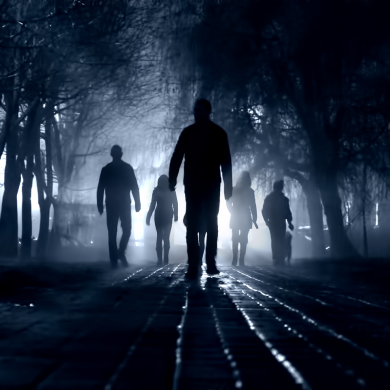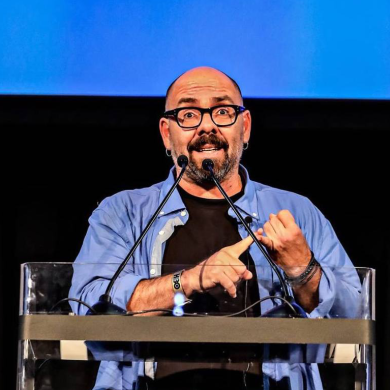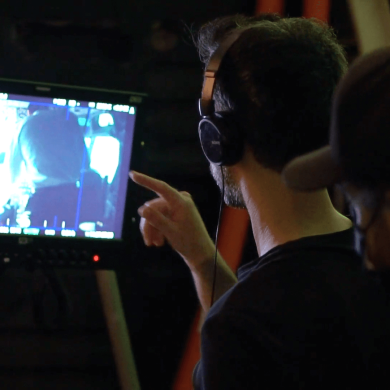By: Gregg LaGambina
Walk into Robin Hatcher’s office at Tinsley Studio and you’ll be met with a framed poster that reads: “KEEP CALM AND LET ROBIN DEAL WITH IT.” This is the type of birthday gift one might expect to get from appreciative co-workers. But talk to anyone at Tinsley Studio and you’ll soon find out the poster is not a joke. It’s a fully functioning philosophy at the makeup and special effects production facility in Burbank, California.
Walk through the front door: “Robin! Someone is here.” Call the studio to set up a visit: “Robin! Someone is on the phone for you!” Talk to Christien Tinsley or Dick Cherry and at some point the name “Robin” will come up, followed by some anecdote about a miraculous feat she pulled off just in time to make everyone’s lives a bit better.
Hatcher returns the favor – over and over again – as we talk about her work as the in-house Makeup Special Effects Supervisor. She will defer to studio owner Christien Tinsley when asked about the particulars of an effect for a television show: “Oh, that’s a question for Christien!” If you ask her about how something was made: “You should talk to Dick about that!” Even when CreativeFuture requested photographs to accompany our conversation with Mr. Cherry, he said, “Let me know when you’ve talked to Robin. She’ll take care of it.”
It became clear after spending time at Tinsley Studio – observing the staff rummage through prosthetic limbs as the UPS man arrived with boxes probably containing more blood and more limbs, or (hopefully!) just office supplies – that Robin Hatcher will be ready for whatever that day has in store for her and everyone else.
CreativeFuture recently visited with Hatcher to find out what it’s like to work as a makeup special effects supervisor, how she became the most reliable spoke in the Tinsley Studio wheel, if this is even the job she always dreamed of having, or if all of this was just an elaborate accident – albeit, a happy one, of course.
Gregg LaGambina: Tinsley Studio is a fun place to visit. I keep staring into corners because I never know what I might find hiding in here.
Robin Hatcher: [Laughs] I do that too but for different reasons! When people come in, I just look around and say, “well this is it really” And they’re like, “No! This is cool. What’s this?”
GL: You’ve been credited as a “creature technician” on a Hellboy film and for Land of the Lost. Your primary job title is “special effects makeup supervisor” on shows such as Westworld and American Horror Story. Who gets into this line of work? Were you the type of kid that didn’t take the fake cobwebs down in her bedroom until three months after Halloween?
RH: Not exactly! I always wanted to be a part of film and television. Originally, I wanted to be in front of the camera, unlike where I am now ¬– behind it, or more likely, nowhere near it [laughs].
GL: What did you study in school?
RH: I have a bachelor’s degree in fine and performing arts. When I came out to Los Angeles, I was pursuing acting and I needed a job that would be flexible. My friend had gotten a receptionist position at Steve Johnson’s Edge FX – back when that was still open – and she introduced me to James Patterson, who was the purchaser there. I bugged him for months about becoming a runner, just so I could have a job, but still have the free time to go out on auditions. I mean, I always watched all kinds of horror films – every kind of film, honestly – growing up, because I was just fascinated with all of it. But working as a runner at Steve Johnson’s is really where I fell in love with makeup effects.
GL: You mentioned the term “purchaser.” Is that part of the work that you do here as well?
RH: Yes – one of my tasks is to oversee the purchasing of FX supplies and handle the shipping of our prosthetics. Day to day I handle all the tattoo and prosthetic transfer orders from a multitude of shows and then when we have a prosthetic build, I am coordinating all aspects of that as well.
GL: FedEx-ing a bloody leg to a film set Germany, for example?
RH: [Laughs] Yeah, exactly!
GL: Nearly every job in the entertainment industry is difficult to get, but how competitive is it to be successful in the special effects realm?
RH: Well, it depends on what you want to do. For my position, I’m not really sure if it is a job people dream about! I know a handful of Coordinators and if you find the right fit, as I Have been lucky enough to do at Tinsley’s, you stay with the same company. I’ve been here for eight years now, which is ridiculous for me to actually think about, or say out loud. But maybe your question is more about artists that want to get into the shop.
GL: Well, for example, when I was given a tour of the shop floor, I saw a person applying a scar to a man’s chest and a young woman painting veins on what looked like an alien fetus. Where do you find these people?
RH: Well, there are people who have been doing this for years – they are sort of the go to people if you are looking for a specific skill. Some people send in their resumes and then others we learn about by word of mouth – recommendations from people who have worked with them.
GL: Is it an accurate description of your job to say that it includes a little bit of everyone else’s job too? Or, does it change depending on the day or the project?
RH: There are tasks that are more daily, some that are based on the project and then there are the unexpected ones that come up each day.
GL: Well, there’s that poster in your office.
RH: The one that says, “Keep Calm and Let Robin Deal with It”? Yeah, my co-workers gave that to me as a birthday gift a couple of years ago. It was really funny. And, they got me a T-shirt to match. My reaction was: “Um, thanks guys?” [laughs].
GL: Let’s start at the beginning of a production. What happens when you’re approached with a show like Westworld? Walk me through that process.
RH: Essentially, we get approached with a script, or a synopsis of what is needed. Westworld started with a conversation and then a script. Christien and I will both read the script and break it down for effects. We will make a list of notes and questions for the Director and/or Producers and once we know what they want to see and how; we come up with a budget for whatever effects have been proposed or agreed upon.
Then, once we are awarded a job – for things like television shows – that’s a constant process. There are Production meetings, reading the next episode’s script, next breakdown, next budget, next schedule, etc. For a film, you just move into scheduling, the actual build, and then the delivery of effects. But that’s usually where it starts – with a script and a phone call.
GL: How often does something appear in a script where you have to tell them that they’re going to need makeup FX where they might have thought they didn’t need it, or vice versa? Does that ever happen?
RH: Occasionally that happens but people pretty much know – or have an idea of – what they want to see.
GL: They know what they want to see – it’s in the script – and you know how to actually make it happen? So, you might suggest some adjustments to best achieve what they want?
RH: Yeah, exactly. It’s a question of, “What do you want to see on-camera? What are you actually trying to see?” Then there is a discussion of what is possible not only practically but also budget wise.
GL: I’m guessing they always want more for less money.
RH: [Pauses] Well, that’s just the world we live in, isn’t it?
GL: So, you get a script, you go over it with Christien, you take the job…
RH: First we get the job – whether it’s a film or a television show – then we have all of the conversations about working out all of the different details. We have to figure out those little nuances of what they want to see on camera. Then the build begins. We hire artists, schedule life casts, work backward from the filming date to calendar when certain aspects of the build, such as sculpture and molding, need to be completed.
GL: And this is all done at Tinsley Studio?
RH: All of the build is done here, yes.
GL: How have budgets changed over the years? It seems like television shows have gotten more expensive to make, while film budgets have either shrunk, or all of the investment is now set aside to make only tent-pole blockbusters and not smaller, independent features.
RH: Well, I would say, years ago, when I first started, you were definitely given a little bit healthier of a budget. And, you were definitely given more time to do things. Sometimes you were given six to nine months to create effects for a film, rather than four to six weeks and sometimes you are lucky to get that.
But, like you said, with more original content coming from cable providers like HBO and STARZ, some of which is quite graphic, there is more of an opportunity for practical effects than say, five years ago.
GL: On that note, let’s go back to your work on Westworld. Compared to the films you’ve worked on, what was that experience like?
RH: There was a lot of work on Westworld and for part of that time we were also working on another show. It was hectic at times and could be quite stressful. When it finally aired, we were all thrilled to watch the show and see all of those months of hard work pay off.
GL: I’m imagining athletes watching video of a recent game and looking for ways to improve before the next one. Is it a common practice at Tinsley to huddle around to watch and critique your own creative work?
RH: No, we don’t typically watch together but we will discuss the shows and the work. In terms of improvement, I think Christien is always watching for that!
GL: You’ve worked on the films Killing Me Softly and The Campaign. The former is a Brad Pitt indie noir; the latter is a comedy starring Zach Galifianakis and Will Ferrell. In other words, was the work required for those two films in any way similar to the work you did for something like Westworld?
RH: No! [Laughs] Those films were so simple, comparatively. As they each only had a handful of effects. Something like American Horror Story or Westworld – it’s just non-stop, it’s continually in flux, it’s multiple effects, and ever-changing schedules. Killing Me Softly and The Campaign both had their own challenges, prosthetics wise. For instance, in Killing Me Softly, Andrew Dominik wanted to shoot a bullet through a hand at 12,000 frames per second. Hiro [Hiroshi Yada] did a lot of work in our Studio creating hands with internal blood packs, bone fragments, etc. We went to the local gun range twice and shot through the hands to make sure it would work.
GL: When you and Christien first get a script and you’re going through it to find out how you will approach your effects work, do you ever have to tell a production that what they want is not possible, or that they might want to try a different effect than what they’ve asked for? Or are you so good at your job, everyone gets exactly what they want, when they want it?
RH: What you’ve described definitely happens, but more often with television because of the timeframe. Sometimes it is a budget issue and occasionally it is simply a physics issue. Figuring out what you can do, what you can’t do – that’s a really important part of this job. Christien never likes to say “No” to people. So, sometimes it’s a matter of, “Well, this is what we can do.” And then we just go from there!






